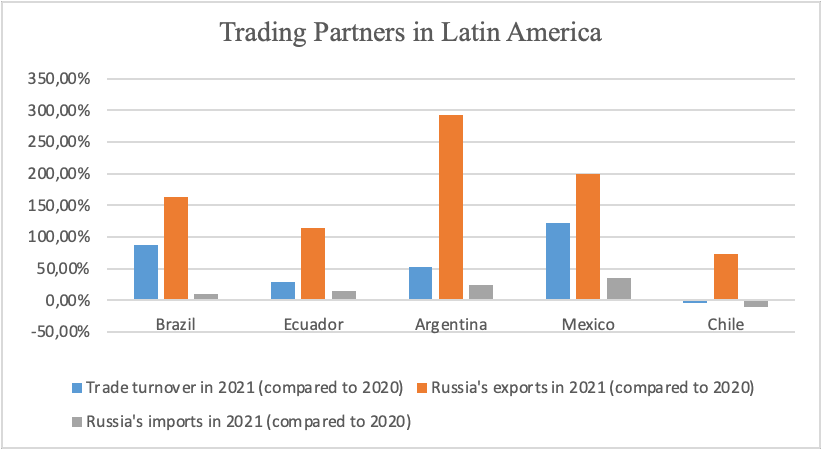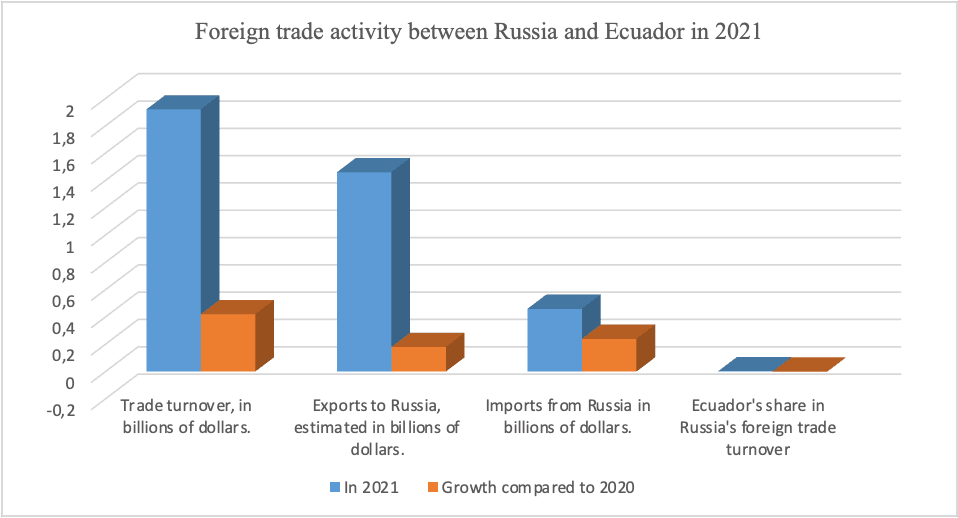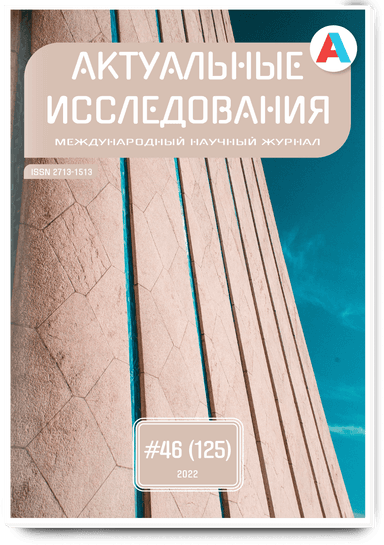Acknowledgements for support to the Secretariat of Higher Education, Science, Technology, and Innovation (in Spanish SENESCYT), Postal Code: 1701518, Quito-Ecuador.
Disclosure statement
No potential conflict of interest was reported by the author.
Historical prerequisites for cooperation between Ecuador and Russia
Under the bipolar world that emerged after World War II, the Soviet Union had close relations with the countries of the Latin American region. Although Ecuadorian-Soviet relations did not develop as actively as the cooperation of the USSR with Latin American countries more favourably inclined to the socialist camp, nevertheless, they had a solid foundation of mutual interests and mutually beneficial cooperation. Diplomatic relations between the USSR and Ecuador were established on June 16, 1945, and the exchange of embassies took place in 1970. In 1969, a trade agreement was concluded between the USSR and Ecuador [1] with the aim of boosting foreign trade between the countries. Nevertheless, to a greater extent in foreign policy, including in foreign trade, Ecuador was aimed at the United States, which at that time dominated the region quite strongly. However, after the "left" government of R. Correa came to power in 2007, seeking to reduce the influence of the United States in the country and expand multi-vector cooperation, relations between Russia and Ecuador began to develop at a more active pace. Thus, it should be noted that in 2009 a Declaration on Strategic Partnership between the countries was signed, the first ever official visit of the President of Ecuador to Russia was carried out, during which a package of important documents regulating Ecuadorian-Russian cooperation in various fields was written: energy, information, and telecommunications, as well as in the field of foreign trade. After Moreno L. came to power in Ecuador in 2017, political and economic relations between the parties also remained at a stable level.
The crisis caused by the pandemic of the new coronavirus Covid-2019 has significantly reduced political, economic, educational, cultural contacts between Russia and Ecuador, as well as tourist flows due to the closure of borders. In addition, due to the special military operation (SVO) that Russia has been conducting on the territory of Ukraine since February 24, 2022, and the unprecedented anti-Russian sanctions that followed, Ecuadorian-Russian cooperation has faced several problems. Even though some countries in this region voted for the UN resolution "Aggression against Ukraine" (only Nicaragua, El Salvador, Cuba, Venezuela, and Bolivia abstained from voting from Latin American countries), most Latin American states are in no hurry to impose sanctions. Russia, in turn, did not include any Latin American country in the list of 48 unfriendly countries. So, for example, the government of Ecuador does not speak sharply about Russian policy in Ukraine, nevertheless, today the country is somehow under the influence of the United States. Thus, Ecuador must balance its interests in terms of cooperation with both Russia and the United States as an important trade and investment partner that has a serious impact on the Ecuadorian economy.
Foreign trade as a key element of Ecuadorian-Russian cooperation
In recent years, Ecuador has consolidated its place among Russia's key trading partners among Latin American countries. So, Ecuador today acts as the second trading partner for Russia in the Latin American region after Brazil. In recent years, there has been a positive trend in the foreign trade turnover between the countries. For example, by the end of 2021, the Ecuadorian-Russian trade turnover increased by 28.8% compared to 2020 and amounted to $1.92 billion. If we compare the indicators of the dynamics of trade turnover for the same period with Russia's key partners in the Latin American region, we can conclude that the most positive dynamics can be traced with Mexico, and with Chile there is a negative increase in the volume of trade turnover (fig. 1).

Fig. 1. Dynamics of indicators of Russia's foreign trade with key trading partners from Latin America in 2021 (Source: compiled by the author according to: [2])
In monetary terms, exports to Russia from Ecuador amounted to $1.46 billion in 2021, and imports from Russia – $0.46 billion, thus, these figures increased by $0.18 billion and $0.24 billion compared to the previous year. Accordingly (fig. 2).

Fig. 2. The main indicators of foreign trade activity between Russia and Ecuador in 2021 (Source: compiled by the author according to: [3])
In 2021, mineral products (mainly petroleum products), chemical industry products (fertilizers, plastics), wood and pulp and paper products, metals (mainly ferrous) and metal products, machinery and equipment were imported most of all from Russia to Ecuador.
The demand for food products (mostly flour and cereals) has increased. Russia imported Ecuadorian food products and agricultural raw materials (bananas, fish, crustaceans, shellfish, cocoa, flowers), which accounted for 99.7% of the share of imports of all goods from Ecuador in 2021 [3]. The largest share of flowers and bananas on the Russian market are of Ecuadorian production. It should be noted that the Covid-2019 pandemic, when logistics chains were disrupted and a logistics crisis was recorded in the world, did not affect the Ecuadorian-Russian trade relations in general. For comparison: with the introduction of anti-Russian sanctions in 2014, foreign trade turnover with Latin American countries decreased by 36% [4, 6-17].
In general, we can talk about the positive dynamics of foreign trade relations between the two countries, as with all Latin American countries [5, 209-226], but so far, the potential of Ecuadorian-Russian trade relations has not been fully disclosed. Thus, Ecuador's share in Russian foreign trade turnover was only 0.24% by the end of 2021 (57th place in the ranking of countries in the world in terms of foreign trade turnover with Russia).
Strengthening cooperation in the context of anti-Russian sanctions
Despite the serious situation that has developed on the world market in the context of the announcement by several Western countries of tough anti-Russian sanctions and the need for Latin American states to manoeuvre between American and their own national interests, Ecuador continues to consider Russia as a reliable economic partner. Moreover, in the conditions of the formation of free niches in the Russian market, Ecuador has a unique opportunity to strengthen its position in Russia as a trading partner. Several researchers emphasize that such an opportunity arose in 2020, in connection with the global logistics crisis, which opens opportunities for new suppliers of goods to the Russian market [6, 57-68].
Today, in foreign trade, Russia continues to implement the processes of reorientation to friendly partner countries to prevent an acute shortage of certain goods on the national market. Thus, the Russian side is gradually replacing several consumer goods, food products, as well as some types of raw materials previously supplied by Western countries with similar goods from friendly countries, thus shifting its foreign trade vector. Today, cooperation with Latin American countries, including Ecuador, is of strategic interest to Russia. To strengthen its position in the Russian market, Ecuador, first, will need to ensure a greater share of independence in making decisions on the Russian issue. In this regard, it should be assumed that Ecuador will not advocate tougher anti-Russian sanctions, since Ecuadorian farmers have already suffered from them in the spring of 2022 (to a greater extent those who grow bananas [7]).
In addition, it becomes important to solve the problems with logistics chains that have arisen. It should be noted that almost all goods from Ecuador were delivered before the tightening of anti-Russian sanctions in 2022 through European ports, which have blocked shipments to Russia several times over the past year. In this regard, it is important to find other ways to deliver Latin American cargo to Russian territory, including through the ports of China. In addition to trade cooperation, which is undoubtedly the most important in Ecuadorian-Russian relations, it is necessary to develop investment and scientific and technical vectors. To date, there has been an insignificant amount of Russian investment in Ecuador, and investment projects between the parties have been isolated. A greater fact, these projects are carried out on the territory of Ecuador and are implemented in such areas as: oil exploration, hydropower, construction. Examples include such projects as: construction of the central station of the Toachi-Pilaton complex by the Russian company PJSC Inter RAO; oil exploration in the Amazon by specialists of PJSC NK Rosneft [8]; construction of the assembly production of VAZ cars in Ecuador by AvtoVAZ [9]. Traditionally, Russia considers such areas as nuclear energy, satellite work, oil and gas exploration as promising areas of cooperation with Latin American countries [10].
The sphere of science and education plays an important role in the expansion of Ecuadorian-Russian cooperation. Russian universities currently have hundreds of Ecuadorian students, specialized centers, and classes at universities for the study of the Russian language are functioning in Ecuador [11], over the past five years, an increase in the total number of Ecuadorians studying at Russian language courses at Russian Centers of Science and Culture in Ecuador has been recorded [12]. Despite the anti-Russian rhetoric in Western countries, the Ecuadorian side continues to promote the expansion of cultural, scientific, and educational contacts with Russia.
Conclusion
That the further development of Ecuadorian-Russian cooperation will depend on the position of the Ecuadorian side on the Russian sanctions issue, initiatives to strengthen cooperation on the part of Russian and Ecuadorian entrepreneurs, and solutions to logistical problems. Nevertheless, cooperation between Ecuador and Russia has sufficient prospects for its expansion in the coming years, including in conditions of global political, economic, and social instability.

.png&w=640&q=75)